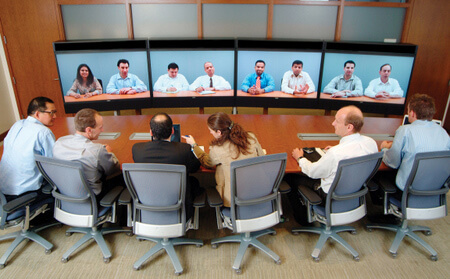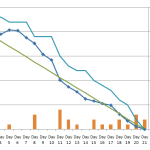In the past, virtual teams faced many challenges which the traditional teams did not encounter.
But these days more often than not traditional teams are behaving more and more like virtual teams and face the same issues.
The fact that all team members are not in the same location all the time is making traditional teams very similar to virtual teams!
People travel, work from home or work from offices across the street or across the ocean.
The effect is the same, not everybody is in the same location, at the same time, all the time!
To properly manage projects and teams remotely, teams need these tools to achieve their goals and to deliver awesome products and services.
Without the proper tools, the odds of project failure will increase substantially.
Communication for Virtual Teams
Face to face conversation is always the best communication method, but most often it is expensive and impractical.
To bring a few people from across the ocean for few hours of meetings, in most cases is a waste of money, time and not to mention the cost to the environment.
If you need to brainstorm with a few people to decide on an urgent issue, chances are that one or more of those people are not in the same location the time you need them and they could be reached only remotely.
Therefore both traditional and remote teams need good communication tools. The following communication tools come in handy for effective conversation and collaboration!
1-Voice & Video Conferencing
Good voice & video conferencing is a must for when you need to have a conference call with people located in many locations. Although not as effective as face to face communication, it is by far the next best option. A good video conferencing system should make it possible for all participants to hear, view and be seen clearly by everybody else in the conference call. Systems which have auto zoom in and out on the speaker are very effective and help the flow of the conversation. The good news is that the cost of video conferencing tools & applications are dropping rapidly and are becoming more affordable even for cash-strapped startups.
2-Group Chat
Sometimes video conferencing is too intrusive of others who are working in the same room and an online group chat application will do just fine. A good group chat should let people join the chat session at any time and make it easy for participants to know which message belongs to whom and who has joined the conversation. It should also archive all conversations and make it available to the chat participants or anybody in the team for future reference!
3-Online Interactive Whiteboard
To be able to brainstorm and view details of a design or a drawing, an online interactive whiteboard plus voice conferencing like Skype or Google is the best choice. A good whiteboard is real-time and all actions done by one is seen by all participants with no delay. The ability to paste & manipulate images is a fantastic collaboration tool. Each project should have its own whiteboard and the content of whiteboard should be saved automatically! Video conferencing does not always replace a good interactive whiteboard. To let more than one person draw or manipulate items on the whiteboard is a feature that is not practical with video conferencing, but is easy on an interactive whiteboard.
4-Messageboard
When communication happens at a time when not all team members could be reached for conversation by voice, video or live chat due to time differences, then a message board is a great option. A message board should have options to carry multiple conversation channels, the capability to attach files and leave comments. A message board also acts as the team’s bulletin board where all information which might be interesting to the whole team can be posted.
Document sharing
Any project team should have a good document storage and document distribution option. Making sure documents are distributed and shared with all those who need to see and review them in a timely manner is critical to the success of the project. Keeping versions and a history of who has done what to any given document helps the team to have access to the most relevant information in real time. It also will enable any member to trace back design or strategic decisions made by the team.
Online Document review & Markup
Reviewing and giving feedback on documents online helps the team to fix and enhance documents in much shorter time intervals than using the traditional way of sharing a document via email and asking for feedback. A great feature that any online document markup should have is to keep the history of the changes to the document. Notice document markup is different than online document editing application like Google Docs. Imagine editing a huge AutoCAD file online, It is not practical! But the same file in PDF or image format could be reviewed and marked up online by one or many people in real time.
Managing Tasks
Projects are consist of Tasks which needs to be done to achieve project goals and therefore a good task manager is a must for the success of the project. The beauty of online task management is that all tasks in the project are available to everybody. Every change or update is instantly shown to all team members. This enhances transparency by flagging all late tasks or tasks which are due soon and bring them to the attention of the entire team. A good task manager should have sub-tasks and option for dependencies plus the ability to leave comments and attach files to both comments & tasks. Tagging tasks permit the team to categorize tasks in groups for easier search and grouping. A cool feature which is found in some project management applications is the option to follow a task or make other team members to follow a task. This makes sure all those who have a stake in a given task are always updated with progress or changes to that task.
Reports
In our busy work, generating reports is a cumbersome and thankless task.
Going over a mountain of data to catalog the information and make it visually understandable to our colleagues and bosses is a time-consuming job!
If the application we use to manage our projects is capable of creating these reports for us, our lives as managers of virtual teams will be a lot more pleasant and productive!
For the best project management software for your traditional or virtual team click here for 1-month free trial!




Pingback: Project management Trends - virtual teams - Collaboration Corner
Pingback: Project management Trends - virtual teams - Collaboration Corner
Pingback: Project management Trends - virtual teams - Collaboration Corner
Pingback: Project management Trends - virtual teams - Collaboration Corner
Pingback: Project management Trends - virtual teams - Collaboration Corner
Pingback: 2016 elections and project management
Pingback: 2016 elections and project management
Pingback: 2016 elections and project management
Pingback: 2016 elections and project management
Pingback: 2016 elections and project management